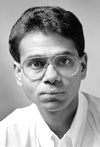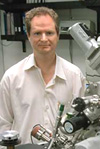| |
|
Today
10
a.m.
EHS 256
Lockout/Tagout
Bldg. 51-201
11:30
a.m. to 2 p.m.
LHS Gift Fair
Cafeteria
1 p.m.
Human Resources
New Employee Orientation
Bldg. 937-649
4 p.m.
Life Sciences Division
Pre-mRna Alternative Splicing in Development and Disease
Thomas Cooper, Baylor U.
Bldg. 66 auditorium
College of Chemistry
Physical Chemistry Seminar
A New Look at Homogeneous Freezing of Ice
Marcia Baker, U. of Washington
120 Latimer Hall
Tomorrow
9:30 a.m.
EHS 275
Confined Space Hazards
Bldg. 51-201
11 a.m.
Nuclear Science Division
Light Nuclei in Potential Models
Robert Wiringa, Argonne National Lab
Bldg. 50 Auditorium
11:30 a.m to 2 p.m.
Lawrence Hall of Science
Holiday Gift Fair
Cafeteria
1
p.m.
EHS 274
Confined Space Retraining
Bldg. 51-201
2
p.m.
EHS 330
Lead Hazards Awareness
Bldg. 51-201
4 p.m.
College of Chemistry
Engineering Improved Adeno-associated Viral Vectors for
Gene Therapy by Directed Evolution
Narendra Maheshri, UC Berkeley
|
|
| |
 |
| |
Market Carvery: Beef Stew with Two
Sides
Fresh Grille: Grilled Chicken Salad
Melt with Garlic Fries
Menutainment: Fiesta Taco Salad
Dinner: Choice of Roasted Garlic Chicken; Prime Rib 8 oz.
cut with Two Sides; or Fried Snapper with Fries and Side Salad
|
|
B'fast: |
6:30
a.m. - 9:30 a.m. |
| Lunch: |
11
a.m. - 1:30 p.m. |
| Dinner: |
5
- 7 p.m. |
Full
Menu
|
|
|
|
 |
 |
|

In
Silico Studies Shed
Light On Immune System
By
Jennifer Patterson Lorenzetti
|
|
 |
|
|
|
| Chakraborty |
|
|
|
Drawing
on the power of a cluster of microcomputers at
Berkeley Lab, researchers, led by Arup
Chakraborty (Materials Sciences Division),
have used computer modeling to point the way to
new findings about the presence of an "adaptive
control function" in the immune system. The
findings not only shed new light on the functioning
of the immune system, but also highlight the utility
of computer modeling in biological research. Full
story.
What
Makes Volcanoes
Explode? It's the Bubbles
Berkeley
Lab earth scientist Michael Manga
and UC Berkeley graduate student Helge Gonnermann
have proposed an explanation for the unpredictable
nature of volcanic eruptions: why volcanoes sometimes
ooze lava, but at other times explode in showers
of ash and pumice. "One of the central problems
of volcanoes is: Why do they erupt and why do
they alternate between relatively benign effusive
eruptions and destructive explosive eruptions?"
said Manga. An article about their research appeared
in the Nov. 27 issue of the journal Nature.
Go here
to read Robert Sanders’ UC Berkeley press
release.
 |
|
 |
|
|
Holiday Shutdown
Begins Dec. 23
Starting
on Tuesday, Dec. 23 at 6 p.m., Facilities will
curtail utility services to about 70 Berkeley
Lab buildings for the duration of the holiday
break, returning to normal operations (weather
permitting) on Thursday, Jan. 1, in preparation
for the Lab's reopening on Friday, Jan. 2. Researchers
needing special monitoring of experiments during
the break should make sure this information is
included in the Special Needs memo submitted to
Facilities by their building manager. This memo
must be received by Facilities by Dec. 12.

|
|
|
|
Latest
Science
Beat is Online
Go
here to read
more about some of the exciting research currently
taking place at the Lab. This issue of Science
Beat includes stories about the mixing of
ethanol and water, a robot that loads and scans
microscopic images, a neutron-beam inspection
method, energy-efficient commercial buildings,
and a NERSC supercomputer that tests pieces of
Cray’s Red Storm.
Crystallography
Confab
at Lab Later This Week
This
Thursday through Sunday, the International Union
of Crystallography (IUCr) and the Consortium for
Materials Properties Research in Earth Sciences
(COMPRES) will hold a workshop at the Lab on the
application of crystallographic techniques to
the study of chemical reactions and phase transitions
induced by the application of high-pressure. The
aim of the workshop is to review the current state
of this field, and to attempt to predict the course
of research in the future. Go here
for more information about the conference.

|
|
|
 |
|
 |
|
|
|
| Alivisatos |
|
|
|
Alivisatos
Wins Best
of Small Tech Award Recognizing
the people, products and companies that are leading
the growth of the micro and nanotechnology industry,
Small Times Magazine announces its “Best
of Small Tech Awards,” which represent the
best of the best in nanotechnology, MEMS and microsystems.
A nanotechnology researcher from Berkeley Lab
won this year’s Best of Small Tech Researcher
Award. Paul Alivisatos designed
a nanocrystal that is expected to improve the
efficiency of hybrid plastic solar cells. Full
story.
|
|
|
|
 |
| |
|

